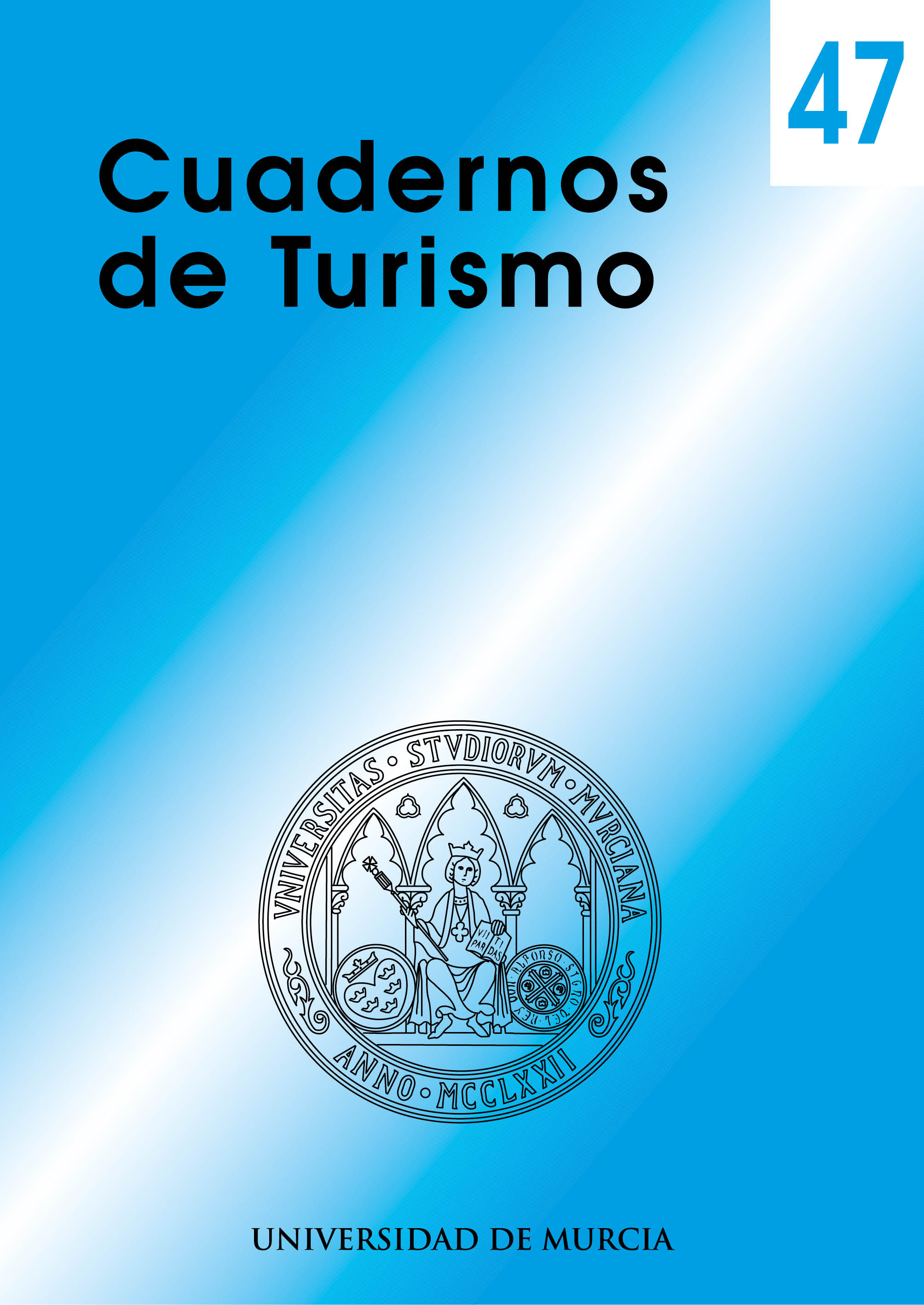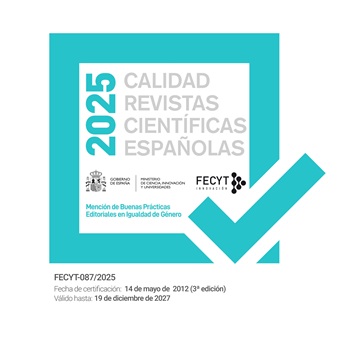GESTIÓN DEL TALENTO DE LOS EMPLEADOS PÚBLICOS DEL SECTOR TURÍSTICO EN ANDALUCÍA
Resumen
La gestión del talento del personal de la Administración Pública del sector turístico es un gran reto. Sobre todo, por la necesidad de dar soluciones a la falta de flexibilidad de sus RRHH en un sector caracterizado por su dinamismo y especialización.
En este trabajo se analiza la situación actual de los empleados públicos en Andalucía, se valida un cuestionario sobre la percepción de sus trabajadores acerca del talento y se desarrolla una herramienta innovadora sobre la Gestión Estratégica del Talento, apoyada en la “Teoría del Valor”, que podría aumentar la productividad y satisfacción entre sus trabajadores.
Descargas
-
Resumen1005
-
PDF969
-
PDF 969
Citas
ALFERAIH, A. (2017): «Developing a conceptual model to measure talent’s turnover intention in tourism organisations of Saudi Arabia», International Journal of Organizational Analysis, vol. 25 (1), pp. 2-23.
ALFERAIH, A., SARWAR, S., y EID, A. (2018): «Talent turnover and retention research: The case of tourism sector organisations in Saudi Arabia», Evidence-based HRM, vol. 6 (2), pp. 166-186.
ALPARSLAN, A. y SANER, T. (2020): «The influence of sustainable talent management on job satisfaction and organizational commitment: Moderating role of in-service training», Revista de Cercetare si Interventie Sociala, nº 69, pp. 96-121.
BAELO, M. y HAZ, F.E. (2019): Metodología de investigación en ciencias sociales y jurídicas. Valencia, Tirant Humanidades.
BARRON, P. (2008): «Education and Talent Management: Implications for the hospitality industry», International Journal of Contemporary Hospitality Management, vol. 20 (7), pp. 730-742.
BHARWANI, S., y TALIB, P. (2017): «Competencies of hotel general managers: a conceptual framework», International Journal of Contemporary Hospitality Management, vol. 29 (1), pp. 393-418.
BLANCO, A. (2016): Liderazgo creador. Inteligencia actitudinal, racionalidad y diseño humano en la Administración. Madrid, Serie Innovación Social, INAP.
BRANDENBURGER, A., y NALEBUFF, B.J. (1995): «The right game: Use game theory to shape strategy», Harvard Business Review, vol. 73 (4), pp. 57-71.
BRATTON, J. y WATON, S. (2018): «Talent Management, emotional labour and the role of line managers in the Scottish hospitality industry: A roundtable discussion», Worldwide Hospitality and Tourism Themes, vol. 10 (1), pp. 57-68.
BOLETÍN OFICIAL DE LA JUNTA DE ANDALUCÍA (2008): «Decreto 43/2008 de 12 de febrero, regulador de las condiciones de implantación y funcionamiento de campos de golf en Andalucía», 12 de febrero de 2008, nº 41, pp. 9-16.
BOLETÍN OFICIAL DEL ESTADO (1985): «Ley 7/1985, de 2 de abril, Reguladora de las Bases del Régimen Local», 3 de abril de 1985, nº 80, pp. 8945-8964.
BOLETÍN OFICIAL DEL ESTADO (2010): «Ley 5/2010, de 11 de junio, de Autonomía Local de Andalucía», 19 de julio de 2010, nº 174, pp. 63395-63451.
BOLETÍN OFICIAL DEL ESTADO (2011): «Ley 13/2011, de 23 de diciembre, del Turismo de Andalucía», 20 de enero de 2012, nº 17, pp. 4732-4771.
BOLETÍN OFICIAL DEL ESTADO (2015): «Real Decreto Legislativo 5/2015, de 30 de octubre, por el que se aprueba el texto refundido de la Ley del Estatuto Básico del Empleado Público», 30 de octubre de 2015, nº 261, pp. 103105-103159.
CEA, M.A. (2009): Metodología cuantitativa. Estrategias y técnicas de investigación social. Madrid, Síntesis Sociología.
CHATAIN, O., y ZEMSKY, P. (2011): «Value creation and value capture with frictions»., Strategic Management Journal, vol. 32, pp. 1.206-1.231.
CONSEJERÍA DE TURISMO Y DEPORTE (2017): Balance del Año Turístico en Andalucía. Disponible en http://cort.as/-MntO Consulta el 25 de febrero de 2019.
CUADRADO-ROURA, J.R., y LÓPEZ-MORALES, J.M. (2014): «El turismo, motor del crecimiento y de la recuperación de la economía española», Estudios Turísticos, nº 200, pp- 19-38.
DEERY, M. (2008): «Talent Management, work-life balance and retention strategies», International Journal of Contemporary Hospitality Management, vol. 20 (7), pp. 792-806.
DEERY, M., y JAGO, L. (2015): «Revisiting Talent Management, work-life balance and retention strategies», International Journal of Contemporary Hospitality Management, vol. 27 (3), pp. 453-472.
DELFGAAUW, J., y DUR. R. (2010): «Managerial Talent, Motivation, and Self-Selection into Public Management», Journal of Public Economics, vol. 94 (9/10), pp. 654-660.
EMPRESA PÚBLICA PARA LA GESTIÓN DEL TURISMO Y EL DEPORTE DE ANDALUCÍA, S.A. (2019) Web de Turismo Andaluz - Solicita información turística. Disponible en http://www.andalucia.org/es/contacta-con-nosotros/busqueda/rapida/ Consulta el 10 de marzo de 2019.
ESIC. Marketing & Business School & Praxis MMT Corporation (2017): «El Informe “Young Business Talents”». Disponible en https://www.youngbusinesstalents.com/wp-content/uploads/2018/06/The-YBT-Report_Spain_Espan%CC%83ol-2018.pdf Consulta el 2 de marzo de 2019.
EUROPEAN PERSONNEL SELECTION OFFICE (2019): «How to apply - Sample tests». Disponible en https://epso.europa.eu/how-to-apply/sample-tests Consulta el 3 de marzo 2019.
FORNELL, C. y LARCKER, D.F. (1981): «Evaluating Structural Equation Models with Unobservable Variables and Measurement Error», Journal of Marketing Research, vol. 18 (1), pp. 39-50.
GAD3, Educa 20.20 y Fundación AXA (2017): «El futuro laboral de los jóvenes. Presentación de resultados nacionales». Disponible en https://www.axa.es/documents/1119421/134089346/E2020+Secundaria+Presentaci%C3%B3n+Espa%C3%B1a.pdf/53302f98-cd6d-cff4-3ddc-10a3b2ec812e Consulta el 2 de marzo de 2019.
HARSCH, K. y FESTING, M. (2020): «Dynamic talent management capabilities and organizational Agility: A qualitative exploration», Human Resource Management, vol. 59 (1), pp. 43-61.
HAUSKNECHT, J.P., RODDA, J. y HOWARD, M.J. (2009): «Targeted employee retention: Performance-based and job-related differences in reported reasons for staying», Human Resource Management, vol. 48 (2), pp. 269-288.
INSTITUTO ANDALUZ DE ADMINISTRACIÓN PÚBLICA (2008): «Análisis de los puestos de Atención Directa a la Ciudadanía». Sevilla. Consejería de Justicia y Administración Pública. Dirección General de Inspección y Evaluación.
INSTITUTO DE ESTADÍSTICA Y CARTOGRAFÍA DE ANDALUCÍA (2017): «Sistema de Información Multiterritorial de Andalucía (SIMA)». Disponible en https://www.juntadeandalucia.es/institutodeestadisticaycartografia/sima/index2.htm Consulta 6 de marzo de 2019.
INSTITUTO NACIONAL DE ESTADÍSTICA (2018): «Cuenta Satélite del Turismo». Disponible en https://www.ine.es/dyngs/INEbase/es/operacion.htm?c=Estadistica_C&cid=1254736169169&menu=ultiDatos&idp=1254735576863 Consulta el 3 de marzo de 2019.
INSTITUTO NACIONAL DE ESTADÍSTICA (2019): «Encuesta de Población Activa». Disponible en http://cort.as/-9vMz Consulta el 3 de marzo de 2019.
JAUHARI, V. y SANJEEV, G. M. (2012): «Responding to the emerging strategic and financial issues in the Indian hospitality industry», Worldwide Hospitality and Tourism Themes, vol. 4 (5), pp. 478-485.
JOOSS, S., MCDONNELL, A., BURBACH, R. y VAIMAN V. (2019): «Conceptualising talent in multinational hotel corporations», International Journal of Contemporary Hospitality Management, vol. 31 (10), pp. 3.879-3.898.
KING, K.A. y VAIMAN, V. (2019): «Enabling effective talent management through a macro-contingent approach: A framework for research and practice», Business Research Quarterly, vol. 22 (3), pp. 194-206.
LI, Z., DUVERGER, P. y YU, L. (2018): «Employee creativity trumps supervisor-subordinate guanxi: Predicting prequitting behaviors in China's hotel industry», Tourism Management, vol. 69, pp. 23-37.
LONGO, F (2004): Mérito y flexibilidad. Las gestión de las personas en las organizaciones del sector público. Barcelona, Ediciones Paidós Ibérica, S.A.
LOON, M., OTAYE-EBEDE, L. y STEWART, J. (2020): «Thriving in the New Normal: The HR Microfoundations of Capabilities for Business Model Innovation. An Integrated Literature Review», Journal of Management Studies, vol. 57 (3), pp. 698-726.
MA, C., REN, L., CHEN, P. y HU, R.X. (2019): «Institute–Hotel Coordinating Barriers to Early Career Management—Hoteliers’ Accounts 2019», Journal of China Tourism Research, vol. 16 (2), pp. 297-317.
MAKAREM, Y., METCALFEB, B.D. Y AFIOUNIA, F. (2019): «A feminist poststructuralist critique of talent management: Toward a more gender sensitive body of knowledge», Business Research Quarterly, vol. 22, pp. 181-193.
MAXWELL, G.A. y MACLEAN, S. (2008): «Talent Management in hospitality and tourism in Scotland: Operational implications and strategic actions», International Journal of Contemporary Hospitality Management, vol. 20 (7), pp. 820-830.
MONDÉJAR, J. (2016): «Análisis multivariante: diseño de encuestas». En. J.L. Sánchez (Presidencia). Jornada de Investigación Turística. Universidad de Málaga. España.
NIJS, S., GALLARDO-GALLARDO, E., DRIES, N. y SELS, L. (2014): «A multidisciplinary review into the definition, operationalization, and measurement of talent», Journal of World Business, vol. 49 (2), pp. 180-191.
NUNNALLY, J.C. y BERNSTEIN, I.H. (1994): Psychometric theory (3rd ed.). New York, McGraw-Hill, Inc.
PAULI, U. y POCZTOWSKI, A. (2019): «Talent management in SMEs: An exploratory study of Polish companies», Entrepreneurial Business and Economics Review, vol. 7 (4), pp. 199-218.
PÉREZ-DEL-PRADO, D. (2018): «¿Qué es el salario emocional? hacia nuevas fórmulas de acción social empresarial». Revista de Información Laboral, nº 1, pp. 235-254.
RICOU, J. (2018): "Fiebre por ser funcionario". La Vanguardia. Recuperado de: https://www.lavanguardia.com/vida/20180305/441278991556/funcionario-empleo-publico-demanda.html.
ROSADO, D.P., ROMÃO, A., LOPES, H.S.C., BALTAZAR, M.S. y FONSECA, D. (2019): «Strategic management and retention of talent: Challenges in the Portuguese Army», Journal of Reviews on Global Economics, vol. 8, pp. 130-140.
SANTOS, J., MUÑOZ, A., JUEZ, P. y CORTIÑAS, P. (2003): Diseño de encuestas para estudios de mercado. Técnicas de muestreo y análisis multivariante. Madrid, Ed. Centro de Estudios Ramón Areces, S.A.
SAVOV, R., LANCARIC, D. y KOZAKOVA, J. (2020): «Size of the Company as the Main Determinant of Talent Management in Slovakia», Journal of Risk and Financial Managemen, vol. 13 (3), pp. 1-14.
SPARROW, P.R. y MAKRAM, H. (2015): «What is the value of talent management? Building value-driven processes within a talent management architecture», Human Resource Management Review, vol. 25 (3), pp. 249-263.
SUNDBO, J. (2009): «Innovation in the experience economy: a taxonomy of innovation organisations», The Service Industries Journal, vol. 29 (4), pp. 431-455.
STIRLING, W.C. (2011): Theory of Conditional Games. Cambridge, Cambridge University Press.
TANSLEY, C. (2011): «What do we mean by the term “talent” in Talent Management?», Industrial and Commercial Training, vol. 43 (5), pp. 266-274.
THOMPSON, P. (2002): Total Reward. London, Chartered Institute of Personnel and Development,
WERTS, C.E., LINN, R.L. y JORESKOG, K.G. (1974): «Intraclass reliability estimates - Testing structural assumptions», Educational and Psychological Measurement, vol. 34 (1), pp. 25-33.
WORLD TRAVEL y TOURISM COUNCIL (2019): «Travel & Tourism Economic Impact 2019». Disponible en https://www.wttc.org/-/media/files/reports/economic-impact-research/regions-2019/world2019.pdf Consulta 10 de marzo 2019.
ZHANG, S. y BRIGHT, D. (2012): «Talent definition and Talent Management recognition in Chinese private-owned enterprises», Journal of Chinese Entrepreneurship, vol. 4 (2), pp. 143-163.
Las obras que se publican en esta revista están sujetas a los siguientes términos:
1. El Servicio de Publicaciones de la Universidad de Murcia (la editorial) conserva los derechos patrimoniales (copyright) de las obras publicadas, y favorece y permite la reutilización de las mismas bajo la licencia de uso indicada en el punto 2.
2. Las obras se publican en la edición electrónica de la revista bajo una licencia Creative Commons Reconocimiento-NoComercial-SinObraDerivada 3.0 España (texto legal). Se pueden copiar, usar, difundir, transmitir y exponer públicamente, siempre que: i) se cite la autoría y la fuente original de su publicación (revista, editorial y URL de la obra); ii) no se usen para fines comerciales; iii) se mencione la existencia y especificaciones de esta licencia de uso.
3. Condiciones de auto-archivo. Se permite y se anima a los autores a difundir electrónicamente las versiones pre-print (versión antes de ser evaluada) y/o post-print (versión evaluada y aceptada para su publicación) de sus obras antes de su publicación, ya que favorece su circulación y difusión más temprana y con ello un posible aumento en su citación y alcance entre la comunidad académica. Color RoMEO: verde.





_.jpg)









